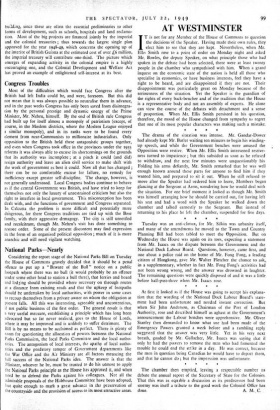Colonial Welfare
It is perhaps not altogether surprising that one of the most popular fallacies about Britain, to be found at home as often as abroad, is that the mother country draws direct financial benefits from the colonies. If we do not exploit the colonies, why do we bother' to keep them ? In point of fact, of course, the colonies are, in varying degrees, of great value to us, but our reciprocal value to them has been enormously increased in recent years. As far as cash payments go the traffic is all from the centre out, and not from the perimeter in, and how considerable that traffic is the recently published Return of Schemes under the Colonial Development and Welfare Act shows. To date this country has contributed £25 million under the Act this represents the amount that has actually been spent, while the total approved is more than double that sum, £63 million. Two- thirds of this total is ear-marked for Africa, about one-quarter for . the West Indies, and the rest divided between the Mediterranean colonies, the Far East, and other scattered dependencies. The money is spent on some welfare plan, or some form of capital development, suggested by the colonies themselves. Agreement has to be reached in London on the allocation of the available funds, but once a scherae has been sanctioned the colony can go ahead in its own way ; supervision is in broad outline only. Naturally a great deal of the resources Ro in capital projects, particularly road- building, since these arc often the essential preliminaries to other forms of development, such as schools, hospitals and land reclama- tion. Most of the big projects arc financed jointly by the imperial and the colonial treasuries ; thus towards the largest single plan approved for the year 1948-49, which concerns the opening up of the interior of British Guiana at the estimated cost of over £6 million, the imperial treasury will contribute one-third. The picture which emerges of expanding activity in the colonial empire is a highly encouraging one, and the Colonial Development and Welfare Act has proved an example of enlightened self-interest at its best.



































 Previous page
Previous page